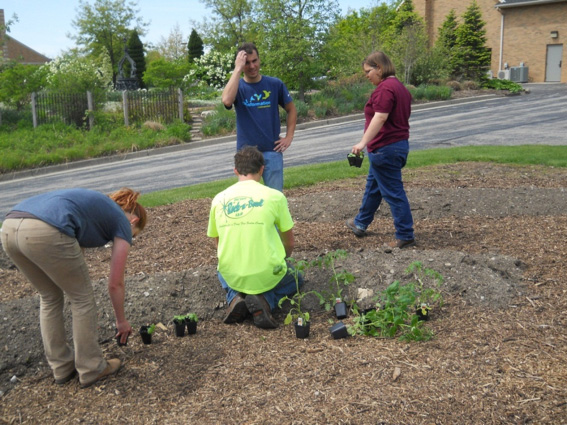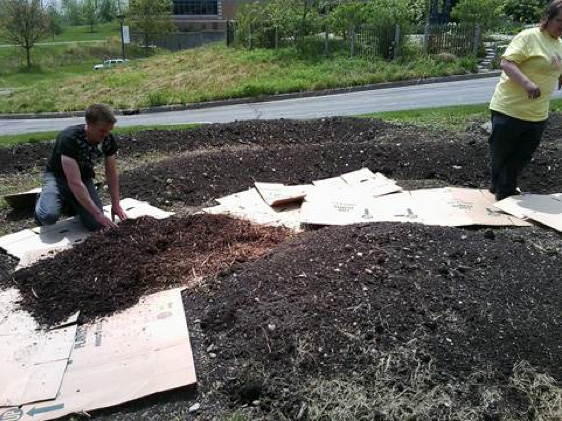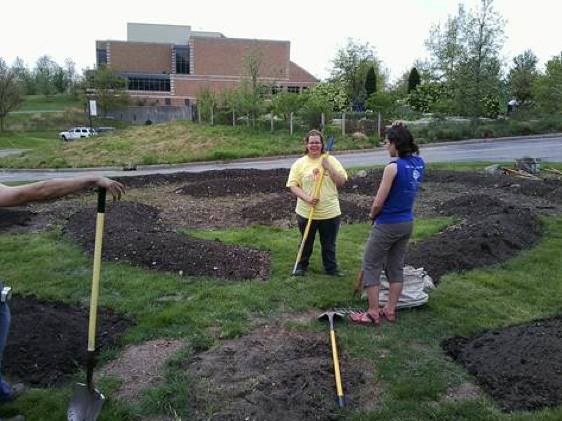BSU Students Launch Permaculture in Muncie
Faye Lichtsinn is a remarkable young woman who decided to make her local community more sustainable before she graduates. Only 20 years old and a student in the department of Natural Resources at Ball State University she was inspired by attending a Power Shift conference in Pittsburgh, PA October 18-21, 2013. This youth movement was designed to involve youth to shift priorities at every level of society, from local communities to the national government, in order to build “a stronger and more vibrant climate movement to fight fracking, divest from fossil fuels, demand climate justice, and build a clean energy economy that works for everyone” (http://www.wearepowershift.org/conference/powershift2013). After Faye attended some permaculture workshops/panel discussions at the conference she decided she could make a difference by becoming involved in sustainable local food production in Muncie and she created the Permaculture Initiative in November 2013.
 The term “permaculture” refers to the use of ecological design along with water resources management to develop regenerative and self-maintained habitats based on natural sustainable ecosystems. The low-impact permaculture model uses a no-dig philosophy. After removing weeds, a layer of cardboard/newspaper is placed on top of the soil to block the light from the weeds. Then mulch/compost/topsoil is placed on top of this for plant nutrients. After introducing the plants, the top of the mix is sprinkled with straw, grass clipping or leaves. (A few pictures of the construction of the garden and planting are shown below). The garden is planned with a mixture of annuals and perennials. In contrast to many modern agricultural methods, this diverse, natural no-dig growing system sustains a continuous cycle, with dead plants becoming mulch for new growth. Permaculture gardening seeks to recreate this cycle, turning food waste into valuable compost and replacing slug pellets, pesticides and weedkillers with natural predators.
The term “permaculture” refers to the use of ecological design along with water resources management to develop regenerative and self-maintained habitats based on natural sustainable ecosystems. The low-impact permaculture model uses a no-dig philosophy. After removing weeds, a layer of cardboard/newspaper is placed on top of the soil to block the light from the weeds. Then mulch/compost/topsoil is placed on top of this for plant nutrients. After introducing the plants, the top of the mix is sprinkled with straw, grass clipping or leaves. (A few pictures of the construction of the garden and planting are shown below). The garden is planned with a mixture of annuals and perennials. In contrast to many modern agricultural methods, this diverse, natural no-dig growing system sustains a continuous cycle, with dead plants becoming mulch for new growth. Permaculture gardening seeks to recreate this cycle, turning food waste into valuable compost and replacing slug pellets, pesticides and weedkillers with natural predators.
 Faye became the lead coordinator of the Permaculture Initiative and recruited many of her friends and fellow students. She established weekly meetings (20-50 attending), coordinated participant research into permaculture practices over the winter and spring, developed a facebook page, organized a blog (thepermacultureinitiative.wordpress.com) and created an email list of 80 other interested individuals (bsupermacultureinitiative@gmail.com).
Faye became the lead coordinator of the Permaculture Initiative and recruited many of her friends and fellow students. She established weekly meetings (20-50 attending), coordinated participant research into permaculture practices over the winter and spring, developed a facebook page, organized a blog (thepermacultureinitiative.wordpress.com) and created an email list of 80 other interested individuals (bsupermacultureinitiative@gmail.com).
Summer 2014 the Permaculture Initiative group will be working at the Hults Envirnomental Learning Center at Ball State University and at the Minnetrista Cultural Center in Muncie to develop, maintain the food gardens using permaculture approaches and to instruct others in permaculture methods. Minnetrista Cultural Center houses artifacts and archival material detailing the history of East Central Indiana, promotes numerous educational and community activities and provides a refuge for diverse native Indiana plant and animal species. The food gardens developed and maintained  by the Permaculture Initiative group will provide excellent educational experiences for university students, children and adults of the community. Thus, Faye has set the bar for the rest of us. What can we do now to make a sustainable difference in our communities?
by the Permaculture Initiative group will provide excellent educational experiences for university students, children and adults of the community. Thus, Faye has set the bar for the rest of us. What can we do now to make a sustainable difference in our communities?
Katlyn Faye Lichtsinn Natural Resources & Environmental Management, Major Anthropology, Major Sustainability, Minor; Spanish, Minor Ball State University kflichtsinn@bsu.edu
Submitted by Carolyn Vann

